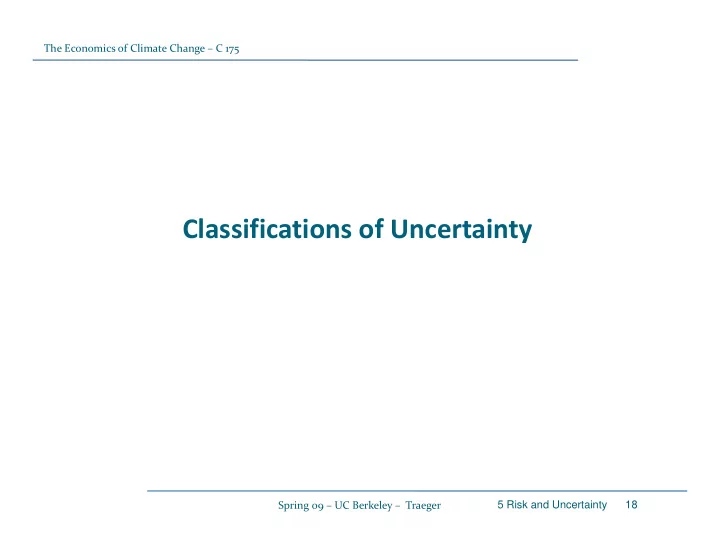

The Economics of Climate Change – C 175 Classifications of Uncertainty Spring 09 – UC Berkeley – Traeger 5 Risk and Uncertainty 18
The Economics of Climate Change – C 175 Classification of Types of Uncertainty (Economic Language) Risk : Unique probabilities describing the uncertainty Objective Subjective Ambiguity/Knightian uncertainty /deep uncertainty: Possible outcomes are known but corresponding probabilities cannot be uniquely assessed are known, but corresponding probabilities cannot be uniquely assessed Unforeseen contingencies : Don’t even foresee possible consequences Exogenous risk : The possible outcomes and their probabilities are given by nature Endogenous risk : E d i k We have some control over the probabilities we will face Spring 09 – UC Berkeley – Traeger 5 Risk and Uncertainty 19
The Economics of Climate Change – C 175 Risk and uncertainty The Unknown. As we know, There are known knowns. There are things we know we know. We also know There are known unknowns. That is to say We know there are some things We do not know. We do not know. But there are also unknown unknowns, The ones we don't know We don't know We don t know. D.H.Rumsfeld—Feb. 12, 2002, Department of Defense news briefing, slightly adapted, see also http://www youtube com/watch?v= RpSv3HjpEw http://www.youtube.com/watch?v=_RpSv3HjpEw Spring 09 – UC Berkeley – Traeger 5 Risk and Uncertainty 20
The Economics of Climate Change – C 175 Uncertainty in the IPCC (Types of Uncertainty, IPCC language) Source: Guidance Notes for Lead Authors of the IPCC Fourth Assessment Report on Addressing Uncertainties Spring 09 – UC Berkeley – Traeger 5 Risk and Uncertainty 21
The Economics of Climate Change – C 175 Uncertainty in the IPCC ‐ Confidence “Table 3, can be used to characterize uncertainty that is based on expert judgment as to the correctness of a model, an analysis or a statement.” Spring 09 – UC Berkeley – Traeger 5 Risk and Uncertainty 22
The Economics of Climate Change – C 175 Uncertainty in the IPCC ‐ Likelihood If enough evidence prevails, IPCC uses “Likelihood” “It refers to a probabilistic assessment of some well defined outcome having occurred or occurring in the future. The categories defined in this table should be considered as having ‘fuzzy’ boundaries . Spring 09 – UC Berkeley – Traeger 5 Risk and Uncertainty 23
Recommend
More recommend